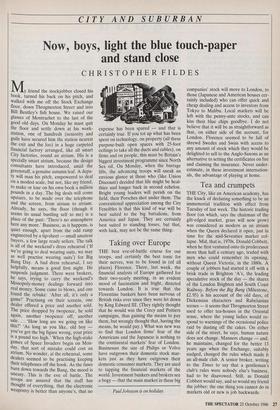CITY AND SUBURBAN
Now, boys, light the blue touch-paper and stand close
CHRISTOPHER FILDES
My friend the stockjobber closed his book, turned his back on his pitch, and walked with me off the Stock Exchange floor, down Throgmorton Street and into Bill Bentley's fish house. We raised our glasses of Montrachet to the last of the good old days. On Monday he must quit the floor and settle down at his work- station, one of hundreds (seniority and guile have secured him the station nearest the exit and the loo) in a huge carpeted financial factory arranged, like all smart City factories, round an atrium. His is a specially smart atrium, because the design consultants have introduced, amid the greenstuff, a genuine autumn leaf. A depu- ty will man his pitch, empowered to deal on a modest scale, but not, like my friend, to make or lose on his own book a million pounds in a day. The big deals will come upstairs, to be made over the telephone and the screen, from atrium to atrium. Already, he says, the floor (though it seems its usual bustling self to me) is a place of the past: 'There's no atmosphere here any more.' Business, as it happens, is quiet enough, apart from the odd ramp engineered by a tip-sheet — small amateur buyers, a few large ready sellers. The talk is all of the weekend's dress rehearsal (If we're going to deal wearing suits, we may as well practise wearing suits') for Big Bang Day. A bad dress rehearsal, I say helpfully, means a good first night. He suspends judgment. There were brokers, he says, trying to carry the weekend's Monopoly-money dealings forward into real money. Some came to blows, and one found the rebuke: 'After all, it's only a game!' Practising on their screens, one dealer offered a price and another sold. The price dropped by twopence, he sold again, another twopence off, another sale, . . 'How long are we going on like this?' As long as you like, old boy — You've got the big figure wrong, your price Is a pound too high.' When the high-stake games of Space Invaders begin on Mon- day, that sort of mistake could cost an atrium. No wonder, at the rehearsal, some dealers seemed to be practising keeping their telephones off the hook. As the fuses burn down towards the Bang, the mood is uneasy. This is the eve of battle. The troops are assured that the staff has thought of everything, that the electronic weaponry is better than anyone's, that no
expense has been spared — and that is certainly true. If you tot up what has been spent on technology, on property (all these purpose-built open spaces with 25-foot ceilings to take all the ducts and cables), on firms and on people, this must be Britain's biggest investment programme since North Sea oil. On Monday, when the barrage lifts, the advancing troops will sneak an envious glance at those who (like Union Discount) decided that life might be heal- thier and longer back in second echelon. Bright young leaders will perish on the field, their Porsches shot under them. The conventional appreciation among the City Fencibles is that this kind of war will be best suited to the big battalions, from America and Japan. They are certainly best suited to standing losses, but that, with luck, may not be the same thing:


























































 Previous page
Previous page